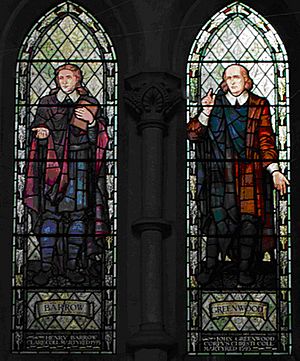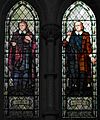Henry Barrowe facts for kids

Henry Barrow (born around 1550 – died April 6, 1593) was an English Separatist Puritan. He was a leader of a group called the Brownists. These groups wanted to separate from the official Church of England. Barrow was put to death because of his beliefs. He led a secret church group in London from 1587 to 1593. During most of this time, he was held in prison. He wrote many books explaining the Brownist ideas, with his most famous being A Brief Discoverie of the False Church.
Contents
Who Was Henry Barrow?
Henry Barrow was born in Norfolk, England, around the year 1550. His family was connected to important people like Nicholas Bacon. He went to Clare College, Cambridge in 1566 and earned his degree in 1570. After college, he lived a carefree life for a while. He also studied law at Gray's Inn, but he did not become a lawyer.
Barrow's Religious Journey
In 1586, Barrow's life changed. He heard a sermon that made him interested in Puritanism. Puritans wanted to "purify" the Church of England. Later, he read a book by Robert Browne, who believed in separating from the Church. Barrow had planned to argue against Browne's ideas, but instead, he became convinced by them.
He then joined a secret group of Separatists in London. This group, known as the London underground church, had been meeting secretly since the 1560s. He became close with John Greenwood, another Separatist leader.
Why Was Barrow Imprisoned?
In 1587, John Greenwood was put in The Clink prison. When Barrow went to visit him, he was also arrested. He was taken before Archbishop John Whitgift. Barrow argued that his arrest was against the law. He refused to promise to appear in court later. Because of this, he was sent to Gatehouse Prison.
After almost six months, he and Greenwood were officially charged in May 1588. They were accused under a law meant for Roman Catholics. They were fined a large sum of money and then moved to the Fleet prison.
Barrow's Stand for His Beliefs
While in prison, Barrow was questioned many times. He even appeared before the Privy Council (a group of the Queen's advisors) in 1589. During these questionings, he strongly defended his belief in separatism. He said that the Church of England's rituals were "false worship." He also called the bishops unfair and cruel.
Barrow's Writings
During his time in prison, Henry Barrow wrote many important books. He argued with Robert Browne, who had made some compromises with the Church. Barrow saw Browne as someone who had given up his true beliefs.
Barrow wrote several books to explain and defend separatism. He also wrote about how local churches should be run independently. Some of his famous works include:
- A True Description of the Visible Congregation of the Saints (1589)
- A Plain Refutation of Mr Gifford’s Booke, intituled A Short Treatise Gainst the Donatistes of England (1590–1591)
- A Brief Discovery of the False Church (1590)
He wrote some of these books with John Greenwood, his fellow prisoner. Their writings were secretly sent to the Netherlands to be published.
The Southwark Independent Church
In 1590, some church leaders tried to talk with Barrow and Greenwood, but they could not change their minds. In 1592, Barrow, Greenwood, and another person named John Penry got a short break from prison. They started meeting at a house and officially formed the Southwark Independent Church.
Barrow's Final Days
In 1593, Barrow and Greenwood were sent back to the Clink prison. They were charged with creating and sharing "seditious books." This meant their writings were seen as a threat to the government. They were found guilty and sentenced to death on March 23, 1593.
The day after their sentence, they were brought out as if they would be executed, but then they were given a delay. On March 31, they were taken to the gallows again, and ropes were placed around their necks. But once more, they were given another delay. Finally, they were hanged early in the morning on April 6, 1593. Some people believe that Lord Treasurer Burghley tried to save them, but the Archbishop Whitgift and other bishops stopped him.
Barrow's Beliefs
Henry Barrow and Robert Browne had similar ideas, but they were not exactly the same. Both believed that the Church had the right to make changes without waiting for the government's permission. They also both supported the idea of independent local churches.
However, Browne saw separation as a way to achieve a spiritual democracy. Barrow, on the other hand, believed that the official church was corrupted by old Roman Catholic practices. He felt that separating was necessary for pure worship. Barrow also believed that church leadership should be in the hands of elders, not the entire group, because he did not trust too much democracy.
Images for kids
 | Sharif Bey |
 | Hale Woodruff |
 | Richmond Barthé |
 | Purvis Young |


